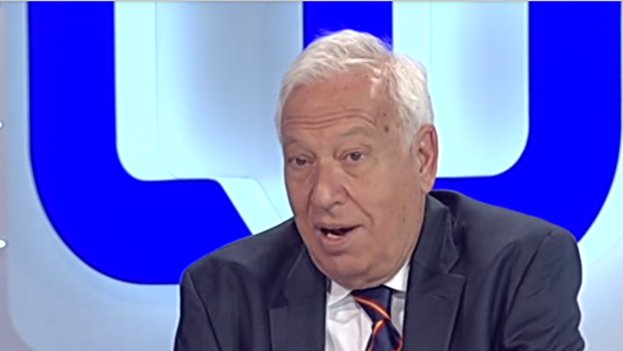
![]() 14ymedio, Madrid, 18 May 2016 — The Spanish Minister of Foreign Affairs and Cooperation, José Manuel García-Margallo, in an interview on Spanish Television on Wednesday, defended his meeting with Raul Castro in Cuba, recalling the ties that unite the two countries, among them the “Spanishness” of the Castros.
14ymedio, Madrid, 18 May 2016 — The Spanish Minister of Foreign Affairs and Cooperation, José Manuel García-Margallo, in an interview on Spanish Television on Wednesday, defended his meeting with Raul Castro in Cuba, recalling the ties that unite the two countries, among them the “Spanishness” of the Castros.
“In Cuba, apart from human relationships, Fidel and Raul’s father was a soldier who fought with our troops [on the Spanish side] in [Cuba’s war of] independence, and then turned. They are very very Spanish,” he said.
The minister appeared on TVE’s “Breakfasts,” a program on a state channel dedicated to political analysis, on his return from a trip to Cuba and Ecuador. Among the questions raised during the interview, García-Margallo was asked about his meeting with the Cuban president and the possible image of legitimizing the regime that this might have sent. The foreign minister asked that his meeting with Raul Castro be seen in context, recalling that Castro had also met recently with Pope Francis and the president of the United States, Barack Obama, as well as representatives from many European countries.
“We have initialed an important chapter in European Union-Cuba [relations] in which we are talking about human rights. In addition, we have normal contact with civil society. Therefore, incorporating this whole chapter of human rights in the agreement is a good sign and Spain cannot be, being who we are and what we have been in Cuba, the only country that is reticent and decides not to go,” defended the minister.
García-Margallo pointed out that Spain is the island’s third largest trading partner, behind only China and Venezuela, and companies in his country manage 90% of the 5-star hotels in Cuba, and 60% of all hotels. In addition, he said Spanish companies are negotiating tenders for the construction of four airports in Cuba, a country with many opportunities for infrastructure. “With Cuba we have such a special relationship that it would be very bad if Spain sat on the sidelines and we let everyone else on the right and the left get ahead of us,” he affirmed.
García-Margallo has framed Spain’s relationship with Cuba in different historical contexts, from the European Union Common Position (promoted in 1996 by former president José María Aznar) up to the new relations of the EU and the US with the island. In addition, he recalled that his position on human rights is clear and was defended by himself during speech on his previous visit to Havana. “The Cuban people, at this moment, primarily want progress and economic development, and we are going to help them in this change,” he concluded.
With regards to Venezuela, García-Margallo announced in this television interview the return to Caracas of the Spanish ambassador, Antonio Perez Hernandez. The minister gave instructions this same morning for the ambassador’s return to Venezuela; he left last April in protest at the “insults” of President Nicolas Maduro toward Spain’s prime minister, Mariano Rajoy. The Venezuelan president called the Spanish president “racist, corrupt trash and colonialist garbage.”
The chief of Spanish diplomacy explained that the reason for the return of the ambassador is the presence or 400,000 citizens with dual nationality who “need protection.” In addition, he said that former Prime Minister Jose Luis Rodriguez Zapatero is in the country and that Albert Rivera, leader of the Citizens Party, will travel there next Monday.
Venezuela is in an “absolutely impossible” situation, Garcia-Margallo said, adding that “we must deploy the foreign service.”
